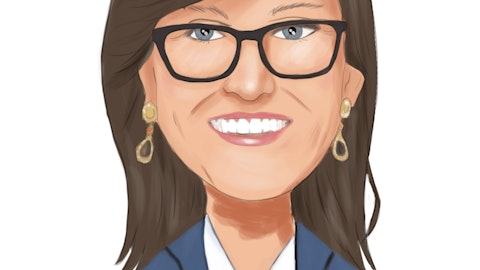Erez Antebi: High-value customers include both postpaid customers, which typically pay a lot more than prepaid, and some of the prepaid customers as well. Prepaid means different things in different geographies. I mean, it’s always in prepaid, obviously, but it’s not necessarily just very, very poor people who have very, very little money and are trying to save every cent. It’s also a way of how people spend their money and how they choose to contract with the telecom operator. So, high-value customers or a mix of both. Now having said that, the majority of the — and you can imagine, this is an APAC customer, tens of millions of customers, we said more than 50 million. We can assume that a majority of them are really very low revenue producing, a very low ARPU type customers to the operator and they will probably not be relevant or not relevant to a large extent to the service.
Marc Silk: Okay. So the report that China continues to basically try to infiltrate Taiwan as far as with phishing et cetera, et cetera, are you seeing that from other Asian countries that might be an impetus to use your products or you don’t really hear that from some of these customers?
Erez Antebi: No. I haven’t heard that as the reason or motivation from any of our customers or any of the operators, neither in Taiwan nor elsewhere.
Marc Silk: Okay. And then I’m just concerned about this 2024 profitability, which I know you’re trying to do the right things here. But I’m worried that we could have a recession next year and then you have another excuse. So, I think it’s important that the executive committee, as you’re looking at this, as they go throughout the rest of the year, they’re going to really make an assessment if you get to — you can get to profitability, because the story is getting a little old and it’s frustrating because you have fantastic technology. So, I think they got to kind of maybe think outside the box because your stock price is not reflecting your revenues or the success of your product. So, has that been discussed as well as saying that maybe a bigger company could do better?
Erez Antebi: I shared what I can from the discussions that with — the conclusions that we had with the executive committee. And I think, as I said with the response to a previous question by someone else on this call, the work is not done. We’ve reached the conclusions until now and we will continue to work to make sure that we find a way both to reach profitability next year and to create shareholder value.
Marc Silk: Okay. And on a positive note, I did see an advertisement for Verizon and I did call them and it’s being well received. And they said there haven’t been any issues with the customers. And they say, usually, if people call us back, then there’s problems and they haven’t really got any call back. So let’s hope that this can accelerate growth and maybe bring some other big customers on board. So good luck, I guess, and I’d like to see the Board and management buy shares in the open market. It’s the only way to show confidence because stock is cheap, money talks. Thank you.
Erez Antebi: Thank you.
Operator: The next question is from Rory Wallace of [Outbridge] (ph). Please go ahead.
Rory Wallace: Hey, Erez and Ziv. Following on Marc’s point there, it does seem like Verizon is showing a pretty good commitment to the service with the way they’ve launched it. The way they priced it, they’re certainly pricing it as a pretty incrementally valuable service of $10 or $20 per line. And there’s obviously 30 million Verizon business lines across their group. But currently, probably 1 million of that or less is on FWA. So, you mentioned potential expansion opportunity within Verizon based on how the service seems to be going for them so far, it would seem logical that they might expand at some point. But I want to understand your thought process around that. And also just when you talk about it being the largest contract that you’ve won and the biggest opportunity you see, what are you sort of basing that analysis around?
Is it the FWA opportunity over a few years’ time and that alone is enough to make it the biggest? Or is it really predicated on kind of growing outside of FWA into the full business group or even the consumer group?
Erez Antebi: Okay. So, I’m obviously very excited about what’s happening in Verizon. And so far, it looks to be successful for everyone, and that’s great. Now, right now, as you mentioned, it has been sold only to fixed wireless access customers. We’re talking and I mentioned this in my notes before, we’re talking to Verizon about — because it’s going well, about possibility to expand that, to expand the service and the reach of the service beyond what it is today. I cannot elaborate whether this will be expanded to and if it will be expanded to anyone. If and when things are concluded, as Verizon allows us to share, I will be happy to share it. Regarding my comment on the size — the potential size of Verizon, I think the contract we have is with Verizon, the company.
No, we don’t have a contract on fixed wireless access in Verizon. We have a contract with Verizon. They have launched it to a specific segment. When I look at overall, I look at the size of Verizon and the potential where this can go. I look at the — not just the size, number of subscribers but also the fact that Verizon is in the United States with high revenue per customer and high ARPU. You mentioned that the price that they’re putting out in the market for the security services between $10 to $20 a month. And I think that translates to a very large opportunity for us. How much of that opportunity will materialize? I do not know. But anyway, I look at it, I believe today that it’s the single largest signed opportunity that we have.
Rory Wallace: Yes, that makes a lot of sense and I appreciate those comments. So yes, good work and congratulations on that launching and it’s been well so far. To your comments on the rest of the U.S. market or sort of halo opportunities coming out of Verizon watching the service, can you give any more specific about the nature of those conversations? I know you — it takes a long time to win these Tier 1s and you’ve been knocking on their doors and having meetings of senior executives for some time in some of these companies. But is it really potentially accelerating actual signings of large merchant opportunities for you?
Erez Antebi: As you said correctly, it’s a long process, it takes time. It’s hard for me to predict any short-term revenue — short-term, sorry, results. So, I would rather not create any expectations that I may not be able to stand behind. So, I think we’re talking to the other operators. I think it’s interesting. I think there’s potential there. But beyond that, I wouldn’t comment.


